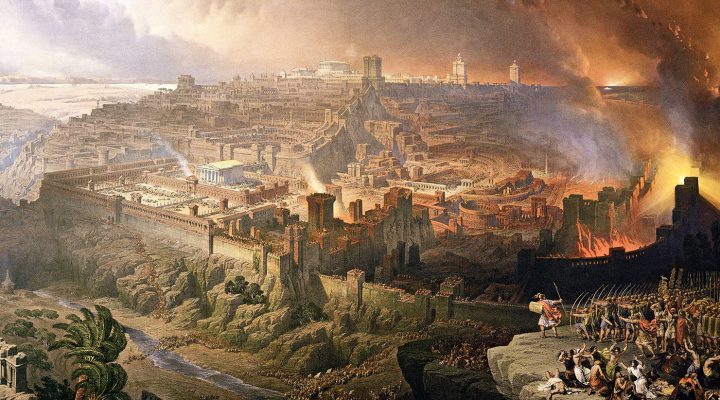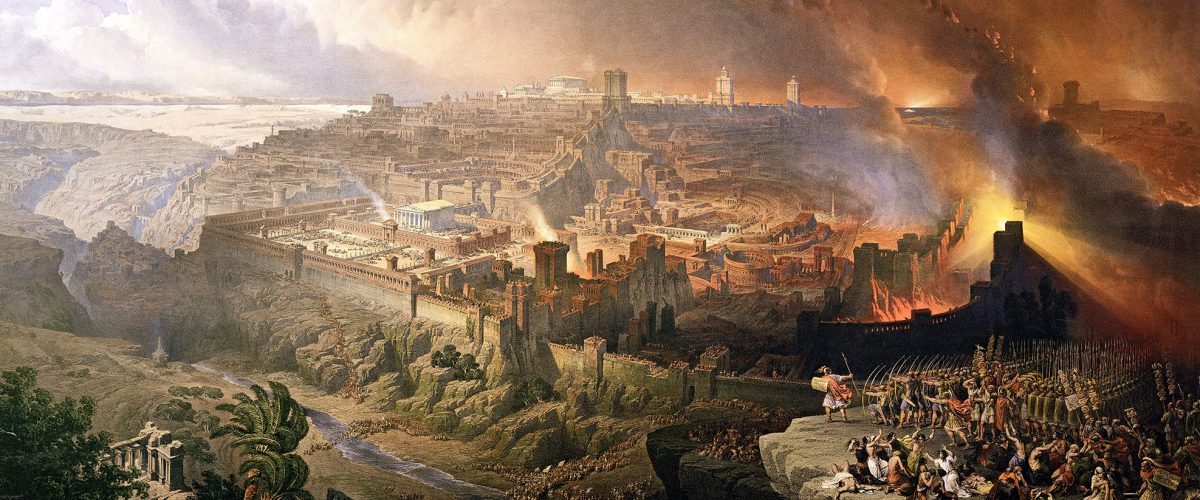In 586 BCE, the armies of Babylon breached the walls of Jerusalem and slaughtered thousands of people. Thousands more were dragged off to exile in far-off Babylon. Solomon’s glorious temple was ground to powder. King Zedekiah fled for his life but didn’t get far. The king of Babylon forced Judah’s last king to watch as, one-by-one, his sons were slaughtered before his eyes. Only then was Zedekiah was blinded, bound and carted off to Babylon.
How could a merciful and all-powerful God allow such things to happen?
The prophet Jeremiah had an answer. Yahweh was using Babylon to punish the sins of Judah. Jeremiah believed this because Yahweh told him so.

Alan Bean
I have met several people who were sure God spoke to them. Most were in mental hospitals or psych wards.
Was Jeremiah crazy? The princes, priests and court prophets in Jerusalem certainly thought so. In their eyes, the man from Anathoth wasn’t just crazy, he was a traitor to boot.
Jeremiah lived in a time of geo-political uncertainty. The Assyrian empire had collapsed and the Egyptians and Babylonians were vying to be the next superpower. The priests, court prophets and princes in Jerusalem had their money on the Egyptians.
“Jeremiah lived in a time of geo-political uncertainty.”
Both sides could appeal to tradition.
The pro-Egypt party took their lead from Manasseh, the longest-lived monarch in Judah’s history. Manasseh viewed Yahweh as a tribal deity who lived in Solomon’s fabulous temple and had promised to protect the king of Judah, so long as he was of the house and lineage of David.
Manasseh reigned from 697 to 642 BCE as a vassal of the Assyrian empire. He never missed a tribute payment. He even gave the gods of Assyria a prominent place in Solomon’s temple and encouraged the worship of Canaanite gods like Ba’al and Asherah.
Manasseh religion was guilt-free. If he wanted to build a bigger palace or renovate a shrine, he enslaved a few more peasants and put them to work.
For the people who mattered (the Assyrian overlords, the priestly and princely classes) Manasseh’s system was a fabulous success. But then Manasseh slept with his fathers and was replaced by Amon, his son. After only two years on the throne, Amon was murdered by the working people of Judah. Since the new king had to be of the house and lineage of David, Amon’s 8-year-old boy, Josiah, was set on the throne.
When Josiah was in his mid-twenties, a “Book of the Law” was discovered in Solomon’s temple. Regarded by most scholars as an early draft of Deuteronomy, the Book of the Law denounced the worship of any god besides Yahweh. The Assyrian idols in the temple and the Canaanite shrines in the countryside had to go.
But that was just the beginning. The Book of the Law equated true religion with national righteousness. In Deuteronomy, Egypt is a land of slavery and oppression. On more than 50 occasions, God’s people were reminded that they were liberated slaves. That’s why they honored the Sabbath. That’s why they showed compassion to immigrants. That’s why slaves had to be released after six years of service with reparation gifts of food, wine and clothing.
“Josiah’s campaign of national repentance eventually came to grief.”
Josiah’s campaign of national repentance eventually came to grief. In 609 BCE, Egyptian Pharaoh Necho marched a vast army through the territory of Judah. Realizing the independence of Judah was at risk, Josiah blocked Necho’s advance.
Judah’s ragtag army was crushed by the Egyptians. Josiah died on the field of battle. When the Babylonians proved too much for the Egyptians, Necho retreated south, making a crucial pitstop in Jerusalem. It was payback time. Judah had selected Jehoahaz, Josiah’s son, to continue the moral revolution. Necho had Jehoahaz deported to Egypt, replacing him with Josiah’s eldest son, Jehoiakim.
In order to become king, Jehoiakim had to renounce the revolutionary ways of his father. Better to serve as a prosperous vassal, like his grandfather Manasseh, than to lose everything on a Quixotic gamble as Josiah had done. Once again, Yahweh was demoted to the status of a tribal deity.
Jeremiah quickly emerged as the champion of Josiah’s moral revolution. Taking up residence outside the temple in Jerusalem, the prophet called his contemporaries to national repentance.
As a cheerleader for Manasseh religion, Jehoiakim saw no reason to repent. In his religious vision, all Yahweh cared about was keeping a son of David sat on the throne and the machinery of temple sacrifice humming. Indifferent to the Book of the Law, Jehoiakim reinstated the slave trade.
Jeremiah was a remorseless critic of Manasseh religion.
Will you steal, murder, commit adultery, swear falsely, make offerings to Baal, and go after other gods that you have not known and then come and stand before me in this house, which is called by my name, and say, ‘We are safe!’ — only to go on doing all these abominations? Has this house, which is called by my name, become a den of robbers in your sight? (Jeremiah 7:9-11)
“Did not your father eat and drink and do justice and righteousness,” Jeremiah asked. “Then it was well with him. He judged the cause of the poor and needy, then it was well. Is not this to know me, says the Lord.”
The prophet declared Yahweh’s verdict on Jehoiakim’s apostasy:
Your eyes and heart
are only on your dishonest gain,
for shedding innocent blood,
and for practicing oppression and violence. (Jeremiah 22: 15-17)
Incensed by these words, Jehoiakim sought to have Jeremiah killed. For a time, the prophet was intimidated into silence, but it didn’t last.
If I say, ‘I will not mention him
or speak any more in his name,’
then within me there is something like a burning fire
shut up in my bones;
I am weary with holding it in,
and I cannot. (Jeremiah 20:9)
When I was in seminary in the 1970s, Roland Bainton was the world’s leading Martin Luther scholar. In a lecture at Southern Seminary, Bainton admitted that he initially saw Luther as an antisemitic crank. A comment from a senior professor changed his mind. “Rollie, you’ll never understand Luther until you tremble.” Like Luther, Jeremiah was called to preach a message so scandalously counter-intuitive that the hearers were bound to be outraged.
“Like Luther, Jeremiah was called to preach a message so scandalously counter-intuitive that the hearers were bound to be outraged.”
Things got so dicey for Jeremiah that, in the manner of Job, he cursed the day he was born. He even compared himself to an innocent girl groomed and seduced by a rapacious deity.
Beginning in childhood, Jeremiah gradually encountered what Abraham Heschel called the “pathos” of Yahweh. Carrying the crushing weight of Judah’s sin, folly and pain full force, Yahweh’s heart was continually being broken. Living with the pathos of Yahweh was more than the prophet could bear. But Manasseh religion was the only alternative.
Four years into Jehoiakim’s reign, the Babylonians crushed Pharaoh’s army in the Syrian town of Carchemish. As the remnants of the Egyptian army retreated to the Nile, Jehoiakim switched his tribute payments to Nebuchadnezzar of Babylon. But when the Egyptians recovered enough to launch a feeble counter-offensive, Jehoiakim returned to the Egyptian fold.
It was a disastrous move. Having put down the Egyptian uprising, Nebuchadnezzar marched on Jerusalem. Fearing the worst, hundreds of Judah’s leading citizens fled to Egypt. After months of siege and starvation, Jehoiakim was murdered by his own servants and his body was thrown over the city walls as a macabre peace offering to the Babylonians. Nebuchadnezzar stripped Solomon’s temple of all its ornamentation and carted Jehoiakim’s son off to Babylon along with thousands of leading citizens.
Jehoiakim was placed by Zedekiah, yet another son of Josiah. Zedekiah had fond memories of his father’s reign and listened to Jeremiah with a respect verging on admiration. Taking his cue from Deuteronomy, he even attempted to end the slave trade.
That proved to be a bridge too far. The princes, priests and prophets of Judah remained in thrall to Manasseh religion. Zedekiah was like a well-intentioned but weak-willed pastor who keeps his radical opinions to himself. Yielding to overwhelming pressure, he eventually reinstated the slave trade and joined Egypt in another hapless rebellion against Nebuchadnezzar.
“Never again would a son of David sit on the throne on Judah. Judah was no more.”
That’s when Zedekiah lost his temple, his city, his sons, his eyes and his freedom. Never again would a son of David sit on the throne on Judah. Judah was no more.
People love Donald Trump because he offers absolution. They don’t have to feel bad about slavery, segregation, the abuse of Native Americans, the criminal justice system, racist cops, misogyny, homophobia, the mistreatment of trans kids or the climate crisis.
Manasseh religion also offered absolution. If Jeremiah was right, repentance, on a massive scale, was required. Priests had to confess that they had downsized their deity. Prophets had to confess that they were preaching the message everyone wanted to hear. Princes had to free their slaves. And everybody had to soften their hearts toward the poor, widows, children and immigrant-sojourners.
It wasn’t good enough for a few hearts to soften. As in the days of Josiah, repentance had to be a communal in scope. Not surprisingly, the community wasn’t interested. Since the leading citizens of Judah were of one mind on the subject, they had to be right. Ergo, Jeremiah is crazy and we have no call to repent.
What if the preaching of Jeremiah had sparked a second Josiah-style reform movement? What if Judah had accepted Babylonian hegemony as the revealed will of Yahweh? There would have been no mass deportations. Solomon’s temple would have survived, its finery intact.
But Josiah religion requires system-wide repentance, justice for the oppressed and economic justice.
The MAGA revolution is a reincarnation of Manasseh religion, and nothing short of a moral revolution can save us.
Alan Bean serves as executive director of Friends of Justice. He is a member of Broadway Baptist Church in Fort Worth, Texas.


